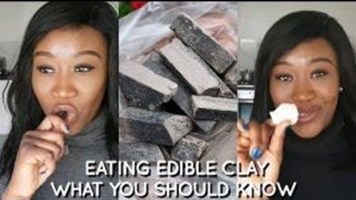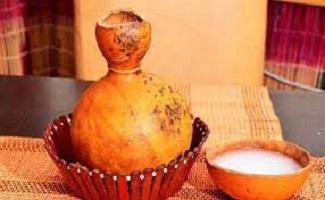What Is Nzu? Everything to Know About Calabash Chalk
What Is Nzu? Everything to Know About Calabash Chalk
Nzu, commonly called calabash chalk, is known by various names in different regions.
In Nigeria, it is called “Nzu.” In French-speaking regions, it is known as “La Craie” or “Argile.” While in the Congo, it is referred to as “Mabele.”
Calabash chalk is a naturally occurring mineral substance traditionally consumed for various reasons, including cultural practices and perceived health benefits.
However, it is important to note that Calabash chalk often contains harmful substances such as lead and arsenic, which can pose significant health risks.
Therefore, it is generally advised to avoid consuming it despite its traditional uses.

Composition
Nzu generally contains:
Kaolin
A type of clay is used in various industries, including cosmetics and medicine,
Other Minerals
These include quartz, feldspar, and occasionally harmful substances such as lead and arsenic.
Traditional Uses
Cultural Practices:
Nzu has been traditionally used in various cultural rituals and practices.
Dietary Supplement:
Some communities consume Nzu, believing it has health benefits such as aiding digestion or providing essential minerals.
Cosmetic Uses:
It is sometimes used in traditional cosmetics for its purported skin benefits.
What Is Nzu? Health Risks
Despite its traditional uses, consuming Nzu poses several health risks due to the presence of toxic substances. Research has identified high levels of:
Lead
Prolonged exposure can lead to lead poisoning, affecting the nervous system, and kidney function, and causing developmental issues in children.
Arsenic
Chronic exposure to arsenic can result in skin lesions, cancer, cardiovascular diseases, and diabetes.
Other Contaminants
Depending on the source, Nzu can also contain other harmful heavy metals.
Medical and Scientific Perspective
Toxicology Studies: Various studies have highlighted the dangerous levels of heavy metals in Nzu, leading to calls for public health advisories against its consumption.
Public Health Recommendations: Health authorities often warn against using or consuming Nzu due to its potential toxicity and lack of scientifically proven health benefits.
Alternatives
For those seeking the purported benefits of Nzu (such as mineral supplementation), safer alternatives include:
Dietary Supplements: Certified and regulated supplements containing essential minerals and vitamins.
Balanced Diet: A varied diet rich in fruits, vegetables, lean proteins, and whole grains can provide necessary nutrients without the risks associated with the white chalk.
Conclusion
While calabash chalk, holds cultural significance and is traditionally used in various forms, its consumption poses significant health risks due to the presence of toxic substances like lead and arsenic.
Public health guidelines strongly advise against the ingestion of this white chalk, and safer alternatives should be sought for those looking for its purported benefits.
If you have been consuming or have health concerns related to it, it is advisable to seek medical advice.


